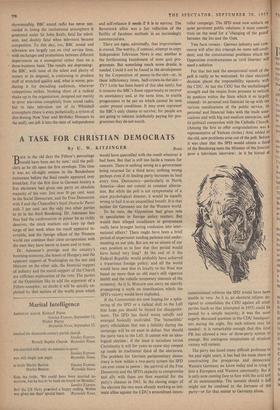A TASK FOR CHRISTIAN DEMOCRATS
By U. W.
D ACK in the old days the Fiffirer's percentage BO would have been out by now,' said the poll- clerk as he slit open the first envelope. This time it was an all-night session in the Bundeshaus restaurant before the final results appeared over breakfast. For the first time in German history a free electorate had given one party an absolute majority of the vote. Just over 30 per cent. went to the Social Democrats; and the Free Democrats with 8 and the Chancellor's loyal Deutsche Partei with 3 per cent. are the only two other parties to sit in the third Bundestag. Dr. Adenauer has thus had the confirmation in power he so richly deserves, the stock markets can keep up their surge of last week when the result appeared in- evitable, and the foreign offices of the Western world can continue their close co-operation with the men they have learnt to know and to trust.
Dr. Adenauer's prestige and the country's booming economy, the lesson of Hungary and the apparent support of Washington on the one and Moscow on the other side, the financial support of industry and the moral support of the Church are sufficient explanation of the vote. The parties of the Opposition like to add the argument of a Filhrer-complex; no doubt it will be quickly ex- ploited by that section of the world press which would have quarrelled with the result whatever it had been. But that is still too facile a reason for concern. There is nothing wrong in a government being returned for a' third term; nothing wrong perhaps even if its leading party increases its lead every time. Democracy—particularly in North America—does not consist in constant alterna- tion. But while the poll is not symptomatic of a mass psychological disaster, it would be equally wrong to hail it as an unqualified benefit. It is that neither for Germany nor for the Western world.
To be sure, the Opposition had given rein to speculation in foreign policy matters. But would their alleged misalliance in government really have brought lasting confusion into inter- national affairs? There might have been a brief period of experiment needing patience and under- standing on our side. But are we so unsure of our own position as to fear that that period would have lasted very long? At the end of it the Federal Republic would probably have achieved a tripartisan foreign policy; and all the world would have seen that its loyalty to the West was based on more than an old man's still vigorous health and the volatile temporary interests of the economy. As it is, Moscow can carry on merrily propagating a myth on reunification which the SPD's victory would have exploded.
If the Communists are now hoping for a splin- tering of the SPD or a radical shift to the Left that hope Itoo should be bound for disappoint- ment. The SPD has faced worse rebuffs and emerged basically undivided. The `monolithic' party officialdom that was a liability during the campaign will be an asset in defeat. Nor should the party turn to the Left. It cannot win an ideo- logical election: if the issue is socialism versus Christianity it will for years to come stay cooped up inside its traditional third of the electorate. The problem for German parliamentary demo- cracy is how within a two-party system the SPD can ever come to power : the survival of the Free Democrats and the SPD's capacity to compromise and ally with them are thus essential for the party's chances in 1961. In the closing stages of the election the two were already working as inti- mate allies against the CDU's streamlined steam- roller campaign. The SPD must now embark on quiet persistent public relations; it must concen- trate on the need for a 'changing of the guard' between the Ins and the Outs.
Two facts remain: German industry and com- merce will after this triumph be more self-confi- dent; and the constitutional problems which the Opposition overdramatises as 'civil liberties' will need a solution.
For that last task the unequivocal result of the poll is really to be welcomed. Its clear electoral decision places the responsibility squarely with the CDU. At last the CDU has the unchallenged strength and the respite from pressure to rethink its position within the State which it so largely created : its personal and financial tie-up with the various ramifications of the public service, its personal and financial links with the trade asso- ciations and with big and medium enterprise, and its political connection with the Catholic Church. (Among the first to offer congratulations was a representative of Vatican circles.) And, added to the old, new problems arise out of the poll. Before it was clear that the SPD would obtain a third of the Bundestag seats the Minister of the Interior gave a television interview : in it he hinted at constitutional reforms the SPD would have been unable to veto. As it is, an electoral reform de- signed to consolidate the CDU against all other parties (such as that attempted in 1955) could be passed by a simple majority; it was the most eagerly discussed question in the CDU headquar- ters during the night. No such reform may be needed: it is remarkable enough that this time PR has allowed a two- or three-party system to emerge. But analogous temptations of absolute victory will remain.
The party has faced many difficult problems in the past eight years; it has had the main share in constructing the prosperous and democratic Western Germany we know today and in tying it into a European and Western community. But it is only now coming face to face with the acid test of its statesmanship. The nemesis should it fail might not be confined to the fortunes of the party—or for that matter to Germany alone.






























 Previous page
Previous page